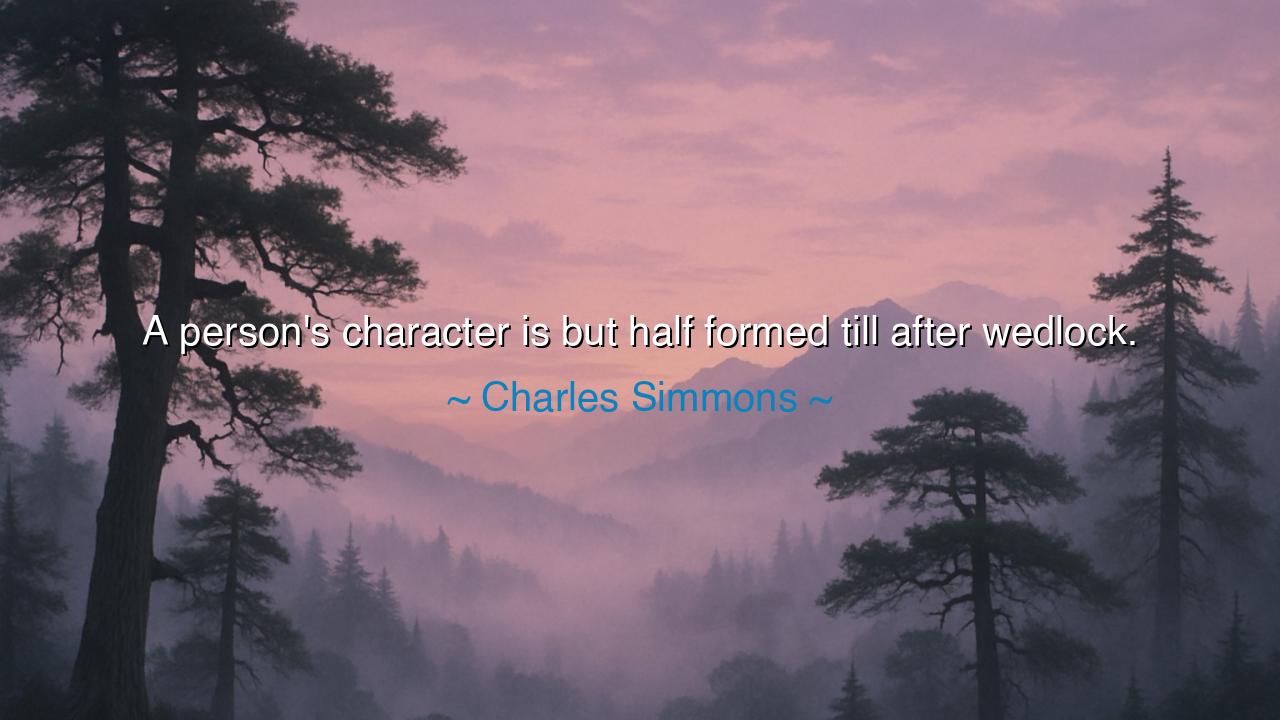
A person's character is but half formed till after wedlock.






The words of Charles Simmons strike with the solemn weight of experience: “A person’s character is but half formed till after wedlock.” In this declaration, he reveals that marriage is not merely a bond of affection but a crucible, a forge in which the self is tested, tempered, and completed. Before union, one walks chiefly in the realm of self; after it, one learns to live for another, to balance desire with duty, freedom with fidelity, independence with responsibility.
For true character is not proven in solitude. Alone, a man or woman may cultivate virtues of patience, discipline, or ambition, but it is only within the bonds of wedlock that these virtues are pressed and tried. To live daily with another soul—sharing burdens, enduring trials, forgiving faults—requires a depth of humility and strength that solitary life rarely demands. Marriage thus becomes a mirror, showing both the nobility and the weakness within, and shaping the person into something fuller and truer.
History offers us luminous examples. Consider John and Abigail Adams, whose letters during the American Revolution testify to a marriage that was both companionship and apprenticeship of the soul. Through war, absence, and hardship, their union refined their character, producing in both wisdom, resilience, and steadfastness. In their partnership, one sees Simmons’s truth: that only through shared life was the greatness of their individual spirits brought to completion.
Simmons’s words also serve as a warning. For marriage can reveal the flaws as well as the virtues of character. Where there is selfishness, it deepens; where there is pride, it festers; but where there is generosity and love, it multiplies. Thus, wedlock does not magically transform, but it completes the work already begun, chiseling the rough stone of the self into a more enduring form.
Therefore, let this wisdom be handed down: do not think yourself whole until you have walked the path of union, whether in marriage or in deep covenant with another soul. For it is in the refining fire of shared life that character is completed. Simmons reminds us that we are not made only for ourselves, but to be shaped through love, sacrifice, and companionship into the fullness of who we are meant to be.






HHHuy Hoang
This quote sparks an intriguing question: does love truly complete us, or simply reveal who we already are? Perhaps marriage doesn’t form character so much as it refines it under pressure. Sharing daily life, responsibilities, and vulnerabilities can act like a mirror. I wonder if Simmons viewed marriage as a test or as a transformation—an experience that turns knowledge into wisdom.
NLmai ngoc linh
I can see truth in this. Marriage often humbles a person—it forces you to see beyond your own perspective. Living with another human being exposes selfishness, pride, and impatience, and demands growth. Yet I also feel uneasy with the implication that character depends on marriage. Isn’t personal evolution possible through other bonds—family, friendship, even solitude?
UGUser Google
There’s an almost moral weight to this idea—that one’s character only fully matures through wedlock. It’s a reminder that love, when lived daily, isn’t just romantic—it’s a discipline. But I also think about how this might have reflected 19th-century values. Would Simmons say the same today, in an age where individuality and self-realization often take precedence over marriage?
QHphung quang hieu
This quote feels both wise and provocative. It makes me wonder if true maturity comes from responsibility—something marriage undeniably demands. When two people merge their lives, they face challenges that test patience, empathy, and endurance. Still, I question whether marriage is the only path to such growth. Can people who remain single or pursue other forms of partnership achieve the same depth of character?
TDLe Thuy Duong
I find this statement fascinating, though somewhat traditional. It suggests that marriage is a kind of finishing school for character. But in today’s world, where many choose not to marry, does that imply their character remains ‘half formed’? Perhaps what Simmons meant is that deep relationships—marital or otherwise—force us to confront our flaws. Maybe it’s intimacy, not the institution, that completes us.